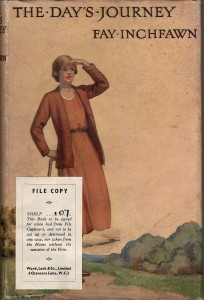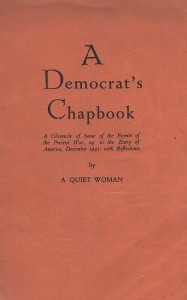 Discovered at Jot HQ is this first edition of one of the ‘Homely Woman’ pocket volumes by the prolific female writer Fay Inchfawn ( aka Elizabeth Rebecca Ward, 1880 – 1978), whose work is forgotten now, but whose books, which included popular verse, religious works and children’s literature, were once, to quote the blurb from her publisher Ward, Lock & Co in 1947, ‘to be found in countless homes, for more than half a million have been sold’.
Discovered at Jot HQ is this first edition of one of the ‘Homely Woman’ pocket volumes by the prolific female writer Fay Inchfawn ( aka Elizabeth Rebecca Ward, 1880 – 1978), whose work is forgotten now, but whose books, which included popular verse, religious works and children’s literature, were once, to quote the blurb from her publisher Ward, Lock & Co in 1947, ‘to be found in countless homes, for more than half a million have been sold’.
To further quote from her publicity department:
‘everyone of Fay Inchfawn’s delightful little books rings with a true sincerity from cover to cover. She can extract joy from the scullery, yes, even from the wash tub…If Fay Inchfawn cannot bring some compensation to you in your humdrum daily toil—well, nobody can ! She has certainly done so for countless wives and mothers, and if you do not happen to be one of those so fortunate, it is up to you to see what she can do for you. Surely she cannot fail ! ‘
Inchfawn, who lived in Freshford, near Bath, for most of her life, also contributed to women’s magazines, and if she didn’t write for my grandmother’s favourite magazine, The People’s Friend, she should have done. The Day’s Journey, which is one of her ‘ religious works‘, seems perfumed with peppermint creams and Werner’s Originals.
A Day’s Journeyis a homily which takes its inspiration from The Pilgrim’s Progress. Its homely message seems to be that like Bunyan’s pilgrim, the wanderer through life will overcome all the difficulties that confront him by applying the self-reliance and common wisdom that God has conferred on him and by ignoring all the vices and distractions placed in his way by the ‘Prince of Evil’. Continue reading

 The identity of the ‘ quiet woman‘ who wrote A Democrat’s Chapbook (1942), a hundred page long commentary in free verse on the events of the Second World War up to the time when America joined the Allied forces, was only revealed when Anne Powell included two passages from it in her anthology of female war poetry, Shadows of War (1999 ). However, those who had read her volume of Georgian verse entitled Songs from the Sussex Downs ( 1915), a copy of which was found in the collection of Wilfred Owen, might have recognised the style as that of ‘Peggy Whitehouse’, whose Mary By the Sea also appeared under this name in 1946. All three books were the work of Mrs Frances Mundy –Castle (1875 – 1959).
The identity of the ‘ quiet woman‘ who wrote A Democrat’s Chapbook (1942), a hundred page long commentary in free verse on the events of the Second World War up to the time when America joined the Allied forces, was only revealed when Anne Powell included two passages from it in her anthology of female war poetry, Shadows of War (1999 ). However, those who had read her volume of Georgian verse entitled Songs from the Sussex Downs ( 1915), a copy of which was found in the collection of Wilfred Owen, might have recognised the style as that of ‘Peggy Whitehouse’, whose Mary By the Sea also appeared under this name in 1946. All three books were the work of Mrs Frances Mundy –Castle (1875 – 1959).



















